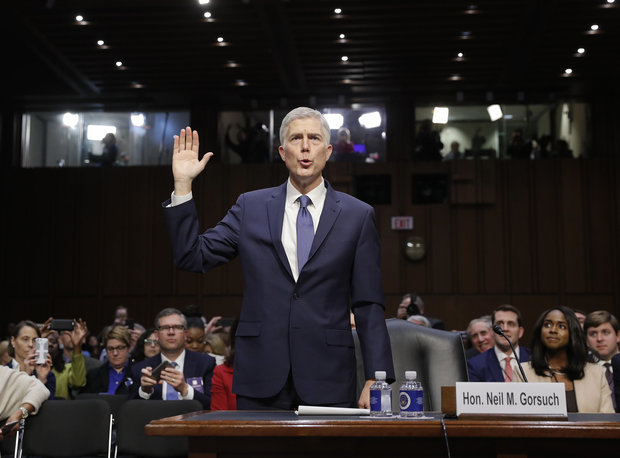The Senate Judiciary Committee held nomination hearings for Judge Neil Gorsuch this past week. President Trump, under the authority of Article 11 of the Constitution, nominated Gorsuch, a Colorado federal appeals court judge, to fill the Supreme Court vacancy left by the late Antonin Scalia who passed away in February 2016.
Remind me…what’s the role of the Supreme Court?
The Supreme Court was established by Article III, §1, of the Constitution, providing that”[t]he judicial Power of the United States, shall be vested in one supreme Court, and in such inferior Courts as the Congress may from time to time ordain and establish.” “The Supreme Court of the United States was created in accordance with this provision and by authority of the Judiciary Act of September 24, 1789 (1 Stat. 73). It was organized on February 2, 1790.”
As NPR reports, in his opening statement, Gorsuch “underscored his commitment to the separation of powers, stating, ‘It is for this body [Congress], the people’s representatives, to make new laws, for the executive to ensure those laws are faithfully enforced and for neutral and independent judges to apply the law in the people’s disputes.’ ”
Gorsuch’s judicial philosophy echoes Scalia’s, writes law professor Jonathan Adler in the Washington Post, quoting a recent speech in which “Gorsuch embraced Scalia’s view that ‘judges should be in the business of declaring what the law is, using the traditional tools of interpretation, rather than pronouncing the law as they might wish it to be in light of their own political views.” Former Obama administration Solicitor General endorsed Gorsuch in a NY Times editorial, noting his “fairness and decency” and believing “his years on the bench reveal a commitment to judicial independence.”
Scalia was associated with originalism, a judicial school of thought that maintains that “the meaning of the Constitution’s text was fixed when each provision was framed and ratified and judges must decide cases in accordance with that fixed meaning.” In contrast, other judicial approaches interpret underlying values expressed implicitly in the Constitution.
This country is uniquely characterized by the belief that everyone is free, free to choose, free to decide, free to build and create. It is founded on important institutions like the Supreme Court. It’s worth taking a moment to read, reflect and discuss the role of Supreme Court judges.
It’s a movement!
Recommend a Circle Leader. Especially in Nebraska, Wisconsin, Minnesota and Missouri where circles are sprouting.
Start a Circle in your neighborhood. Add value in your community by giving women the facts and the space to strengthen their understanding of the issues.
Invest in The Policy Circle. Together let’s build a network of women who want to assume their civic duties and understand the impact of policy in their lives.
The Policy Circle is a 501(c)3 that provides a fact-based, nonpartisan framework that inspires women living in the same community to connect, learn about and discuss public policies that impact their lives. Women across the nation are taking a leadership role in public policy dialogue on what human creativity can accomplish in a free market economy.
